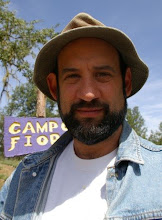The other day, I got a phone call. My neighbor and fellow beekeeper told me that another mutual neighbor and beekeeper had just called her. Her hive was in trouble. During a routine check, she opened the hive to find almost no bees inside. Her initial assessment was that some yellow jacket wasps had pillaged the hive and killed the bees.
I had opened up my hives a few weeks ago. But when you hear stories like that, you have to have a looksie. Today I suited up and marched out, smoker in hand, to open up my hives and make sure they were all okay. To tell the truth, I have been worried. The farm is located quite close to the Ventana Wilderness. Yes, the same forest that stretches all the way down to Big Sur. And yes, the same forest that in July was home to the sixth largest forest fire in the state. In fact, the fire made it as close as two miles to the farm. For over a month, the air was smokey. Neighbors were reporting bee swarms. We all know that bees are highly affected by smoke, so I was naturally concerned what affect this could have on the poor critters. Bee keepers use smoke because it causes the bees to calm. The usually return to the hive and try to eat. Gorge themselves really. No one know why. There is speculation that it is an instinct exactly to protect bees from forest fires. If you are going to loose your home, better eat up, because it might take a long while before you can establish a new one. Yes, I have been wondering what all that smoke, every day, for a month would do to them.
I picked one hive I noticed had few bees coming and going. When I lifted the lid, I knew immediately something was wrong. Usually, when you lift the lid, you can hear the familiar buzzing sound of all those little ladies going about their business. Today, there was only silence. Inside, there were a few bees, but the hive was empty. Ohhh.....
Well, the hive wasn't completely empty, there were a few hive robbers. Bees, wasps, ants, etc. But my suspicion was that the bees in there were not the original occupants. The combs were empty. No babies, no honey. There was quite a few cells packed w/ pollen. But that was it. I did find quite a few supercedure cells, the cells the bees make when they are trying to replace the queen. I figure she had perished, and they tried to replace her. But why?
The next hive I checked was chaulk full of bees and honey. All was well there. So I moved on.
The third hive was good too. But the forth was dead. Same scenario. This time there were dead bees on the inner cover under the lid. The remaining hives were not dead, but one other seems to be failing. In that one, there were quite a few dead bees. But there is some fairly advanced larvae. Almost no honey though.
Two of the hives that were still thriving didn't seem to have much honey reserves though. So I've started feeding them sugar syrup again. There is only a few more months to winter. I definitely want them to build up their reserves before colder weather sets in. I will have to clean out the other hives, and restart them next spring.
I was pretty bummed. I suppose farming can't always smell like lavender.
Subscribe to:
Post Comments (Atom)


No comments:
Post a Comment